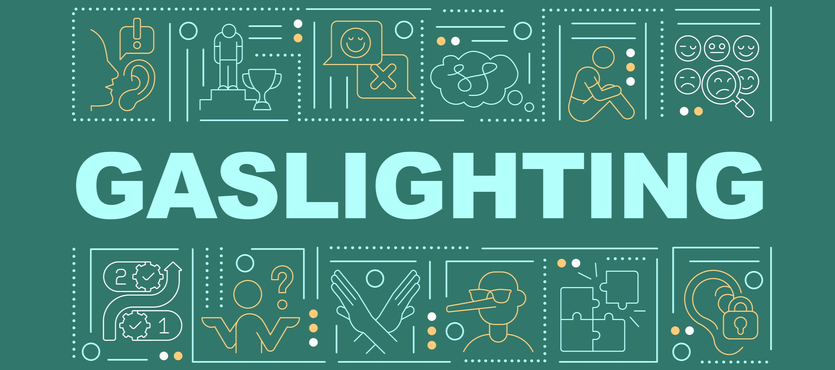Relationships are not always healthy. Many family and romantic relationships have physical or emotional abuse involved. A common type of abuse that has become popular in recent years is gaslighting. The term “gaslight” comes from a 1944 movie with the same name. Mental cruelty at its worst, it refers to the act of undermining another person’s reality. A person will do this by denying facts and feelings. They may also question the environment around them.
Victims of gaslighting are manipulated into turning against their cognition and emotions. They may question their own reality and think they are crazy. Almost all of us are being gaslighted by someone or have been at some point, whether it is by a celebrity, public figure, someone at work, friends, or family.
Gaslighting can happen in any kind of relationship. While it is most common in romantic settings, gaslighting can happen in relationships with unequal power dynamics when one person is so important to the other. The gaslighter can be a parent, sibling, friend, or boss.
Gaslighting can have a long-term impact on a person’s emotional and psychological well-being. Because of this, it is important to learn how to spot gaslighting and shut it down before it places an extreme psychological impact on our daily lives.
Signs of Gaslighting
Think you may be a victim of gaslighting? Here are the signs to look for:
- You question your thoughts and reality. An abuser will use various techniques to convince you that you are wrong and the abuser is right. You may not think you are being abused at all. You are likely to repeat phrases that have been fed to you by the abuser on multiple occasions.
- You feel too sensitive. The abuser will often try to minimize their hurtful behavior by claiming they are joking. You may try to convince yourself that you are just “too sensitive.” This allows the abuser to place all the blame on you. You may feel as though you are unable to make decisions for yourself.
- You feel confused. Your abuser may act two-faced, like Dr. Jekyll and Mr. Hyde. Which version of your partner is the real person? Is your partner really “nice” and you are just trying to minimize the “bad” version? Your partner might be telling you that you are “always a little confused,” further questioning your reality.
- You wonder if you are good enough. Your partner’s constant abuse and insults may make you wonder what is wrong with you. Will you ever be good enough for your partner? You may be unhappy and feel like something is wrong, but you are not quite sure what it is exactly.
- You are constantly frustrated. As time passes, you may feel weaker and more passive. There will likely be anxiety and depression as the abuser continues to inflict mental distress on you. You choose to remain silent so you do not irritate your partner, even though you know you need to be stronger. This may leave you feeling frustrated, hopeless, and defeated.
- You feel alone. Your abuser will isolate you from friends and family. They will convince you that everyone also thinks you are crazy and mentally unstable. Your lack of social support will cause you to feel helpless because you have nobody to whom you can turn. You may feel like you are constantly “walking on eggshells” to avoid your partner’s angry and dismissive behavior. You do not know what else to do but put up with the behavior.
- You are always apologizing. You should not be constantly apologizing for behaviors that were not even your fault. However, you may feel responsible for your abuser’s complaints and you may apologize just so you do not have to deal with the abuser’s behavior. You should not have to apologize multiple times a day for bad behavior. This is a major red flag.
What to Do
If you feel as though you are being mentally abused, you need to be aware of it and put an end to it. Once you recognize the problem, you can move on to these steps:
- Separate the truth from lies. Take note of the conversation so you can review it thoroughly. At what point does it stop being reality and turn into denial? Are you having the same conversations over and over again? Write down how you felt.
- Change your mindset. Visualize yourself without the relationship and be positive about it, even if it makes you feel anxious. Look forward to better days down the road when you will have your own reality and social support.
- Give up the relationship. Know that it is OK to walk away from a toxic relationship. It will be difficult, but you will need to do it.
- Talk to your friends. Ask for their honest opinion. How do they feel about you? Do you seem like yourself? What do they think of your partner’s behavior?
- Focus on feelings. You may wonder who is right and who is wrong. Instead, think about how you feel. Pay attention to conversations that leave you feeling bad about yourself. Your emotional well-being in a relationship is more important than who is right or wrong.
Seek Legal Help
Gaslighting is an abusive technique that makes people question their own reality. You need to identify it and shut it down before it impacts your mental health. When it occurs in a marriage, it often leads to divorce.
Ready to move on from an abusive relationship? Seek legal help from Broward County divorce attorney Scott J. Stadler. We have resources that can help you after divorce. Get started with a consultation. Call (954) 398-5712 or fill out the online form.

